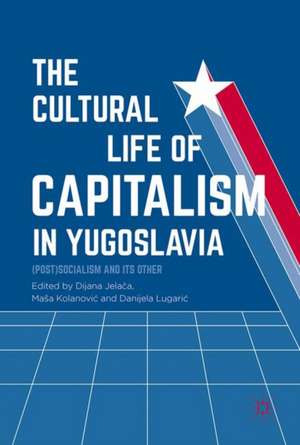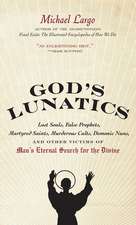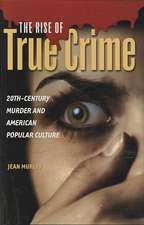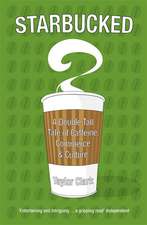The Cultural Life of Capitalism in Yugoslavia: (Post)Socialism and Its Other
Editat de Dijana Jelača, Maša Kolanović, Danijela Lugarićen Limba Engleză Hardback – 26 iul 2017
| Toate formatele și edițiile | Preț | Express |
|---|---|---|
| Paperback (1) | 635.01 lei 38-44 zile | |
| Springer International Publishing – aug 2018 | 635.01 lei 38-44 zile | |
| Hardback (1) | 709.25 lei 43-57 zile | |
| Springer International Publishing – 26 iul 2017 | 709.25 lei 43-57 zile |
Preț: 709.25 lei
Preț vechi: 834.41 lei
-15% Nou
Puncte Express: 1064
Preț estimativ în valută:
135.76€ • 147.51$ • 114.11£
135.76€ • 147.51$ • 114.11£
Carte tipărită la comandă
Livrare economică 21 aprilie-05 mai
Preluare comenzi: 021 569.72.76
Specificații
ISBN-13: 9783319474816
ISBN-10: 3319474812
Pagini: 442
Ilustrații: XVII, 359 p. 9 illus., 6 illus. in color.
Dimensiuni: 148 x 210 x 27 mm
Greutate: 0.76 kg
Ediția:1st ed. 2017
Editura: Springer International Publishing
Colecția Palgrave Macmillan
Locul publicării:Cham, Switzerland
ISBN-10: 3319474812
Pagini: 442
Ilustrații: XVII, 359 p. 9 illus., 6 illus. in color.
Dimensiuni: 148 x 210 x 27 mm
Greutate: 0.76 kg
Ediția:1st ed. 2017
Editura: Springer International Publishing
Colecția Palgrave Macmillan
Locul publicării:Cham, Switzerland
Cuprins
1. Introduction: Cultural Capitalism the (Post)Yugoslav Way.- 2. The Strange Absence of Capital(ism).- 3. Fictions of Crime in a State of Exception.- 4. Rethinking Class in Socialist Yugoslavia: Labor, Body, and Moral Economy.- 5. The Restoration of Capitalism after Yugoslavia: Cultural Capital, Class and Power.- 6. Class and Culture in Yugoslav Factory Newspapers.- 7. Post-Yugoslav Notes on Marx's Class Theory and Middle Class Classism.- 8. On Yugoslav Market Socialism through Živojin Pavlović’s When I Am Dead and Pale (1967).- 9. Against Capitalism from the Stalinist Cellar: The Balkan Spy in the Post-Yugoslav Context.- 10. The Contested Place of the Detached Home in Yugoslavia’s Socialist Cities.- 11. Yugoslavia Looking Westward: Transnational Consumer Contact with Italy during the 1960s.- 12. Popular Hybrids the Yugoslav Way: What a Girl Would Buy for Her Pocket Money.- 13. Protesting for Production: The Dita FactoryOccupation and the Struggle for Justice in Bosnia and Herzegovina.- 14. The Politics of (Post)Socialist Sexuality: American Foreign Policy in Bosnia and Kosovo.- 15. The Strange Case of Yugoslav Feminism: Feminism and Socialism in “the East”.- 16. Cultural Politics in (Post)Socialist Croatia: The Question of (Dis)Continuity.- 17. Neoliberal Discourse and Rhetoric in Croatian Higher Education.- 18. Yugoslavia after Yugoslavia: Graffiti about Yugoslavia in the Post-Yugoslav Urban Landscape.
Notă biografică
Dijana Jelača is Adjunct Instructor in the Department of Communication and Media Studies at Fordham University, USA. She is the author of Dislocated Screen Memory: Narrating Trauma in Post-Yugoslav Cinema (2016) and co-editor of The Routledge Companion to Cinema and Gender (2017).
Maša Kolanović is Associate Professor of Contemporary Croatian Literature at the University of Zagreb, Croatia. She is the author of Udarnik! Buntovnik? Potrošač…Popularna kultura i hrvatski roman od socijalizma do tranzicije (Worker! Rebel? Consumer… Popular Culture and Croatian Novel from Socialism till Transition, 2011) and edited volume Komparativni postsocijalizam: slavenska iskustva (Comparative Postsocialism: Slavic Experiences, 2013).
Danijela Lugarić is Associate Professor of East-Slavic Languages and Literature and the Director of the Institute of Literary Studies at the University of Zagreb, Croatia. She isthe author of Ruski bardi: modusi popularnog u kantautorskoj poeziji Bulata Okudžave i Vladimira Vysockog (Russian Bards: Popular Aspects in the Author’s Song of Bulat Okudzhava and Vladimir Vysotsky, 2011).
Maša Kolanović is Associate Professor of Contemporary Croatian Literature at the University of Zagreb, Croatia. She is the author of Udarnik! Buntovnik? Potrošač…Popularna kultura i hrvatski roman od socijalizma do tranzicije (Worker! Rebel? Consumer… Popular Culture and Croatian Novel from Socialism till Transition, 2011) and edited volume Komparativni postsocijalizam: slavenska iskustva (Comparative Postsocialism: Slavic Experiences, 2013).
Danijela Lugarić is Associate Professor of East-Slavic Languages and Literature and the Director of the Institute of Literary Studies at the University of Zagreb, Croatia. She isthe author of Ruski bardi: modusi popularnog u kantautorskoj poeziji Bulata Okudžave i Vladimira Vysockog (Russian Bards: Popular Aspects in the Author’s Song of Bulat Okudzhava and Vladimir Vysotsky, 2011).
Textul de pe ultima copertă
This edited volume explores the cultural life of capitalism during socialist and post-socialist times within the geopolitical context of the former Yugoslavia. Through a variety of cutting edge essays at the intersections of critical cultural studies, material culture, visual culture, neo-Marxist theories and situated critiques of neoliberalism, the volume rethinks the relationship between capitalism and socialism. Rather than treating capitalism and socialism as mutually exclusive systems of political, social and economic order, the volume puts forth the idea that in the context of the former Yugoslavia, they are marked by a mutually intertwined existence not only on the economic level, but also on the level of cultural production and consumption. It argues that culture—although very often treated as secondary in the analyses of either socialism, capitalism or their relationship—has an important role in defining, negotiating, and resisting the social, political and economic values of both systems.
Caracteristici
Examines the complex and transformative nature of cultural forms that perpetually challenge the capitalism vs. socialism binary in provocative ways that extend beyond the case of Yugoslavia Brings together leading scholars and emerging stars in the field across disciplines to offer a truly multidisciplinary approach to the experience and legacy of post-socialist issues and culture via a unified theoretical framework Provides insight to the intricacies of Yugoslavia’s arguably unorthodox form of socialism Includes supplementary material: sn.pub/extras










